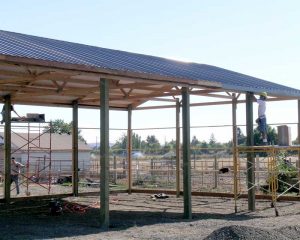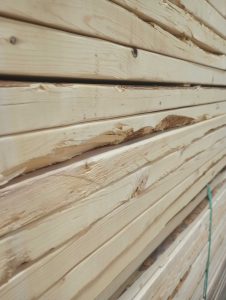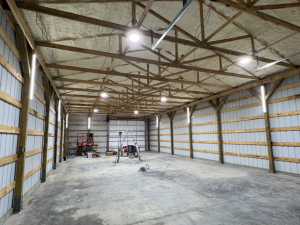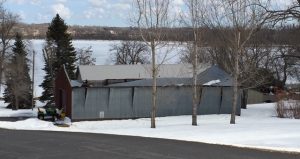By guest blogger J.A.Hansen, owner of Hansen Buildings
Where I left you yesterday was watching an inferno blazing away at 1800 degrees, 3 feet from a wood framed firewall. This carefully monitored firewall test was carried out in a UL testing facility under strict conditions to see if a structurally independent wall made of wood framing and 4 layers of gypsum board could sustain a 3 hour firewall test. Besides fire, pressures by hydraulic jacks to test up to 21,000 pounds per column were applied.
After one hour, the joints in the outermost 1st of 4 layers of drywall began to open up. The joints began to separate from moisture leaving the gypsum board. After two hours, 2-1/2 layers of drywall had fallen off. At 3 hours, there was still one layer left. At 3 hours and 47 minutes, the frame cavity became exposed and girts began to burn. There was more deflection of the columns, so they had to stop the test. But 3:47! This was a considered a huge success.
 A second identical post frame wall was then tested. The second part of the testing was water pressure on the fire side starting at the one hour mark of applying fire. Water pressure exerted was 30 psi at a distance of 20 feet from the wall. Water was applied for 5 minutes, which is twice the 2-1/2 minute requirement. The water stream was applied to the firewall in an up and down pattern every 16 inches. Again, with twenty ducts blowing fire and water pressure, the wall held up.
A second identical post frame wall was then tested. The second part of the testing was water pressure on the fire side starting at the one hour mark of applying fire. Water pressure exerted was 30 psi at a distance of 20 feet from the wall. Water was applied for 5 minutes, which is twice the 2-1/2 minute requirement. The water stream was applied to the firewall in an up and down pattern every 16 inches. Again, with twenty ducts blowing fire and water pressure, the wall held up.
A couple of comments on what was, and was not tested. The drywall was not “finished”, meaning joints taped and sprayed with a paint or other sealant. The wood used was 2400 msr nontreated lumber, girts were 1600 msr spf. No other lumber grade was tested, and only 5/8” drywall was used. Instead of nails, screw fasteners were used to apply the drywall. Future testing may include ¾” drywall, to see if 3 layers may be able to withstand the fire test, instead of 4 of the 5/8”. Because 5/8” is more commonly easily obtained, ¾” may not afford any advantages if cost and ease of obtaining it are factored in. Also, it is noted adding more lumber to the framing will help to withstand the fire and downward pressure of the hydraulic jacks, to make it last even longer than the 3 hours and 47 minutes.
The conclusion was this firewall test surpassed expectations, and now gives a UL rating to post frame construction of a firewall for 3 hours. It was a great testament to using wood framing for a fire wall, as long as the minimum assembly requirements are carefully followed. You can finish the drywall, you can increase the size of the 4×6’s and you can add insulation and it won’t deter from the firewall. The important factors were the spacing of the posts, using flat girts (not bookshelf girts) along with girt blocks and the spacing of the drywall joints.
Down the road more testing of other species of wood, using glu-lams and also trying other drywall depths may bring an even more cost effective, and yet totally wood framed, 3 hour firewall. But so far, the results were impressive to offer a more cost effective (over concrete blocks), and yet 3 hour “safe” firewall…totally framed with wood.
For more information on this, go to the UL website: www.database.ul.com and look for publication: BXUV.V304 Fire Resistance Ratings – ANSI/UL 263.









